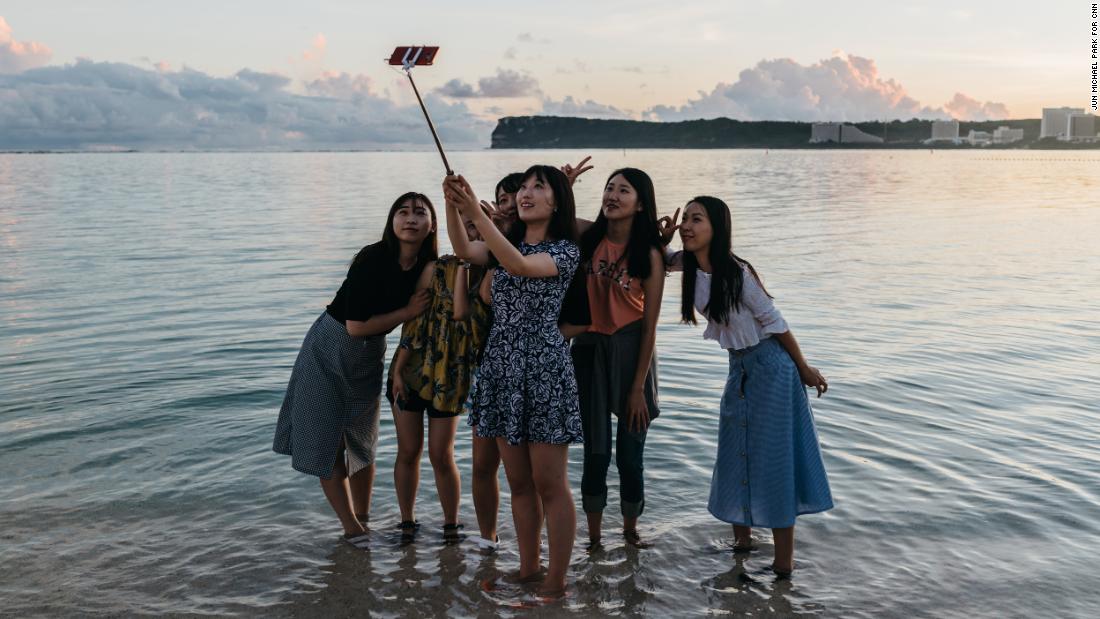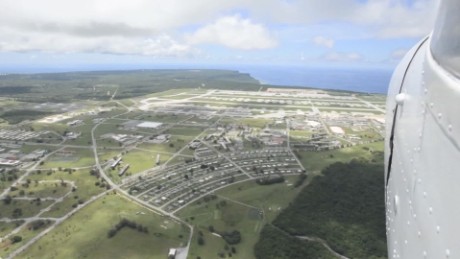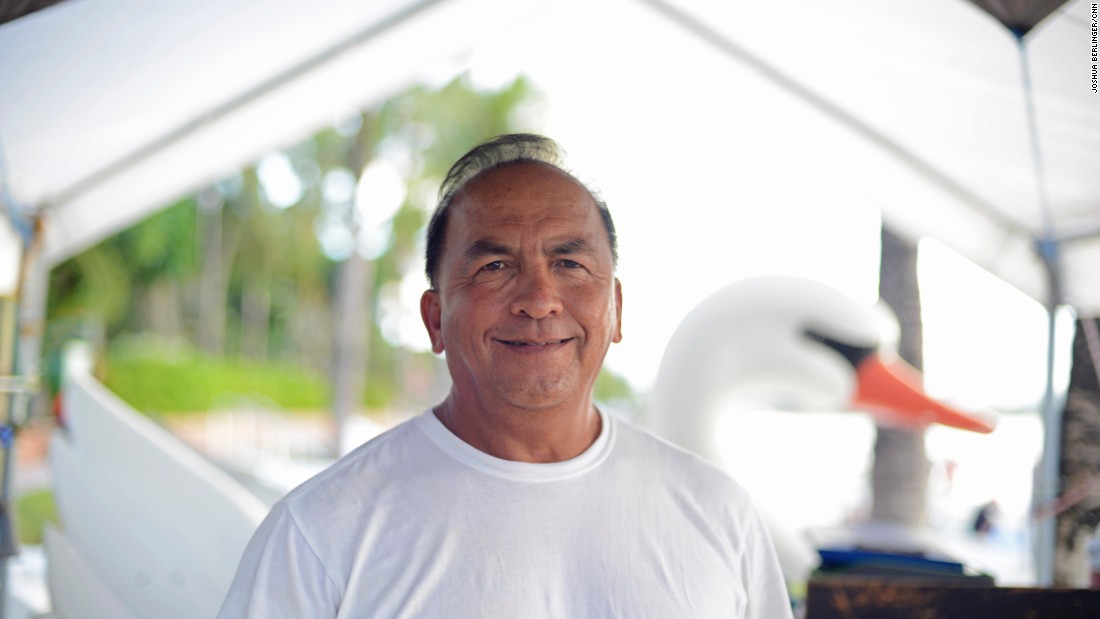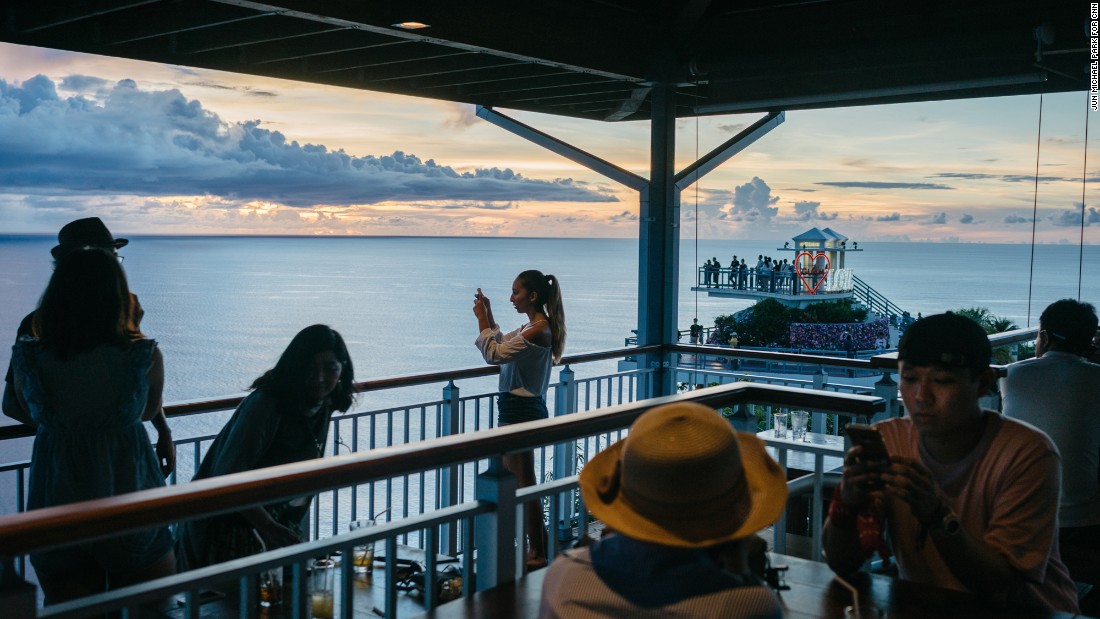Unfazed by North Korea's threats, tourists still heading to Guam
Tumon, Guam (CNN)As the sun broke over the white sands of Guam's Tumon Beach, Duhyun Na and her friends made their way down to the shoreline with their smartphones and selfie sticks.
Their flight landed at 3 a.m., but they wanted to see the sunrise and get some photographs to start their five-day trip.
Vacationing in Guam during this particular moment in time, with the island ensnared in a heated exchange of threatening rhetoric between the United States and North Korea, may seem like a strange choice to some.
But Na and her friends aren't concerned about the saber rattling: they're South Korean.
"Always, North Korea threatens South Korea. It doesn't mean (anything) to us," she told CNN.
South Koreans have lived with the artillery of their belligerent neighbor pointed at them since the end of the Korean War in 1953. North Korean state media often says the country plans to turn the South Korean capital of Seoul into a "sea of fire."

Duhyun Na, right, and her friends take selfies at Ypao Beach Park.
Tourists like Na and her friends are one of the two keys to Guam's economy. The other is defense.
"The economy of Guam is based on two things: We sell paradise and we sell strategic location," George Charfauros, Guam's Homeland Security adviser said. "There is a delicate balance. We need to maintain that balance. One cannot outweigh the other."
About 40% of Guam's economy is dependent on the military, which operates two important bases and owns a third of the island's land.
Tourism, however, is the lifeblood for the island's civilian population. The island broke a 20-year record for most visitors -- more than 130,000 -- in a single month in July, according to the Guam Visitors Bureau. Tourists spend about $1.6 billion a year on Guam, whereas federal defense spending totals $2 billion.
Many of them are families from throughout Asia, looking for warm waters and a quick slice of the easy island life.
Authorities have expressed concern that the current US-North Korea hostile standoff could affect whether visitors choose Guam as their vacation destination.
Tensions have eased somewhat in recent days. According to North Korean state media, the country's generals have finalized plans to strike waters off Guam, but leader Kim Jong Un is holding off giving the order while he waits to see what the US does next. US-South Korean military exercises planned for next week could reignite the situation.
Jon Nathan Denight, the CEO of Guam Visitor's Bureau, said so far it does not seem tourism numbers have been affected, but they are getting inquiries from their offices in Japan and South Korea -- the two top sources of tourists -- about the situation on the ground.
"Tourism is a very competitive industry," Denight said. "People's opinions can be influenced can be swayed by negative information."
Military impact
Guam's authorities have stressed in recent days that the threat level has not changed on the island but a potential hit to tourism is on the forefront of officials' minds.
"If history is telling and this thing continues, that's what I'm concerned about," Guam Gov. Eddie Baza Calvo said at a news conference this week.
Caught in the middle: The 4,000-year-old people sharing their island with the US military.
"Desert Storm (the 1991 Gulf War) had an impact on tourism in Guam, even though it was in the Middle East ... even the SARS epidemic had a problem for Guam in terms of tourist numbers."
And those on the island who work in the hospitality and tourism industries are concerned the heated back-and-forth could scare away customers, despite US President Donald Trump's prediction, in a phone call with Gov. Calvo, that tourism would increase "like tenfold" with the media attention.

What you need to know about Guam
"We need the tourism to keep Guam going," said Jodiann Santos, who works at the Guam Museum.
Both sides of the beach
At dusk on Tumon beach, one of the island's most popular tourist spots, hordes of Korean and Japanese tourists turn in their beach paraphernalia, like inner tubes and snorkels.
Edwin Cruz has been working on this beach for 17 years. He isn't worried about the threat of missiles near the island.
Cruz, 59, hasn't noticed a change in the number of tourists and doesn't expect to see them stop coming -- especially visits by South Koreans, which jumped by a quarter last month.

Edwin Cruz, 59, works on Guam's Tumon Beach.
"They're used to it," said Cruz, who works at ISA Aqua Sports just outside the Outrigger Guam Beach Resort. "If they're not worried, I don't think we should be worried."
But that's not much comfort to Marino John, a 24-year-old bartender, who works at the beachfront bar of the Dusit Thani resort just a couple hundred feet or so from Cruz.
"I'm a little worried," John said.
Guam's infrastructure caters to South Koreans like Na and her friends. Signs in Korean offering services like shuttle buses are easy to spot in tourist areas.
Visits by Japanese tourist were down 5% last month, a fact authorities blamed on fewer flight connections -- but they still make up the largest group of visitors after South Koreans.

Marino John, 24, a bartender in Guam.
Too dangerous
Na thinks Guam is beautiful, but it wasn't her first choice.
She and her friends were going to go to the Philippines, but they canceled because with a drug war and a battle against Islamic militants in the country's south, they thought it was too dangerous.
Guam's officials aren't taking the tourist industry's current resilience in the face of North Korea's threats for granted -- they know its reputation as an island paradise can easily be overshadowed.
"The industry is fragile to the point where if you have natural or man-made disasters, it will have an impact," said Gov. Calvo.
News Courtesy: www.cnn.com












